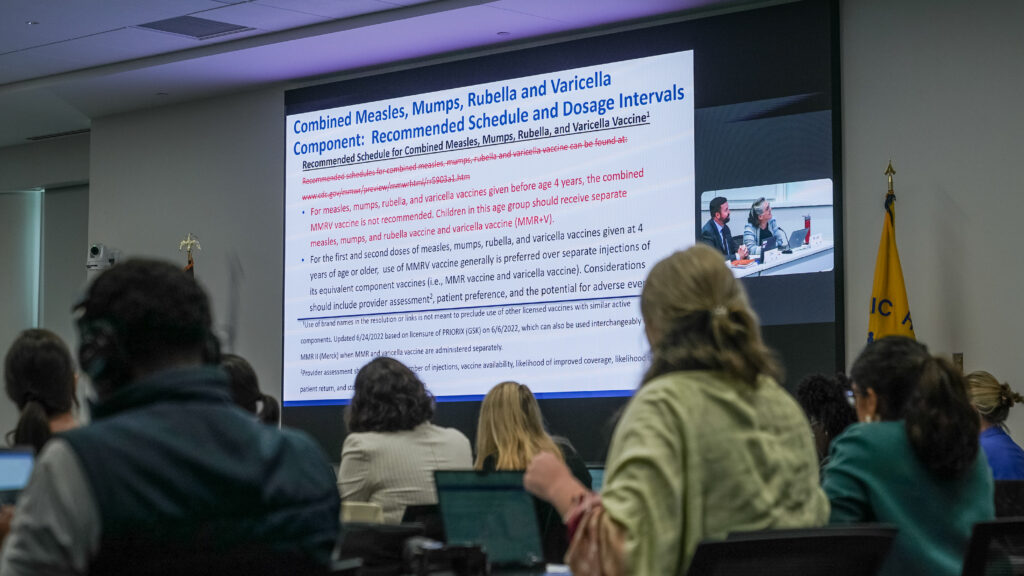
ATLANTA — Health and Human Services Secretary Robert F. Kennedy Jr. has said he wants his handpicked panel of vaccine advisers to restore declining public trust in vaccines.
What that looked like was on full display on Thursday and Friday: The 12-person committee, which includes several scientists and researchers who’ve questioned or spread misinformation about vaccines, raised doubts about vaccine safety and effectiveness data presented by CDC experts, floated a variety of theoretical or unsupported concerns of their own, and revisited decades-old vaccine policy based on what they claimed were concerns from parents and patients, not a public health need or fresh data.
Advertisement
By the end of the two-day meeting, the group’s actions appeared to be modest, but they added to the moves that Kennedy, a longtime skeptic of vaccines, and his subordinates, have made to limit access to proven shots since taking office. And they underscored how the group, known as the Advisory Committee on Immunization Practices, or ACIP, has moved away from the science-based framework for decisionmaking it has used for more than a decade to weigh the risks and benefits of vaccines.
The panel voted to restrict a combined measles, mumps, rubella and varicella shot (MMRV) to children over age four, citing a heightened risk of febrile seizures, while pulling back the panel’s previous backing of the broad administration of Covid shots (albeit preserving insurance coverage for them). After hours of debate, members also tabled a vote on delaying hepatitis B shots that are now given at birth. ACIP’s recommendations need to be approved by the acting director of the Centers for Disease Control and Prevention, Jim O’Neill, to become final.
“I commend the committee for bringing overdue scientific debate on vaccination to the American people,” O’Neill said in a statement.
Advertisement
During the animated discussion on delaying hepatitis B shots, Jason Goldman, a liaison with the American College of Physicians, repeatedly unmuted his microphone — over the objections of chair Martin Kulldorff — to plead with the panel for more information.
“That is why the evidence to recommend framework was created so we would have the standard to be able to vet all vaccines, but that is not being used. So if you can kindly, respectfully tell the public how you are going to be analyzing all of these vaccine decisions, we can have confidence in this committee as previously,” he said.
More changes could be coming. At the start of the meeting, Kulldorff said that workgroups would reexamine the vaccines that CDC recommends for babies and kids and for pregnant women.
A vaccine meeting amid broader CDC turmoil
The ACIP meeting came on the heels of turmoil at the CDC, after Kennedy dismissed Director Susan Monarez just a month into the job, over vaccine policy. Monarez told members of Congress on Wednesday that Kennedy pressured her to say that she would sign-off on vaccine recommendations from ACIP, regardless of the evidence.
And she warned that Kennedy plans to make changes to the childhood vaccine schedule without “data or science to point to.”
Bill Cassidy, the Republican senator who invited Monarez to testify, said at one point during the hearing that any changes put forth by ACIP shouldn’t be trusted. On Friday, Cassidy, a physician, said that postponing the vote on the hepatitis B vaccine was the “right call.”
And the lead-up to the ACIP meeting broke protocol in other ways: Former CDC Chief Medical Officer Deb Houry testified at the same Senate hearing that she had “significant concerns” about the meeting given that proposed recommendations and other materials weren’t posted publicly ahead of the meeting.
Leading medical groups that would usually offer insight and perspective have been cut out, even as the panel’s chair opened the meeting by calling for more public debate on vaccines, and at times during public comment periods, panel members milled about, out of their seats.
Advertisement
Additionally, employees of the CDC’s vaccine center were completely shut out of preparation for the meeting, two CDC employees with knowledge of the situation told STAT, though CDC experts did present data and take questions from members. In the past, the center’s leadership has presented at the meetings, but this time they did not.
Combined with the deviation from norms was a sense of the panel’s inexperience with health care policy. Members repeatedly asked for more information about the effects of their votes before casting them. At one point, the committee voted to maintain broad coverage of the combination MMRV shot in a program that offers free vaccines, and then reversed itself a day later. The panel’s chair, Martin Kulldorff, said members didn’t understand the question being asked during the initial vote.
At another point, members debated whether or not to recommend that states require prescriptions for Covid-19 vaccines, an area the committee doesn’t typically weigh in on. They narrowly voted not to.
Advisers, outside experts weigh trust in shots
One member, Robert Malone, a researcher who has both claimed to have invented part of mRNA technology and denounced it, gave the clearest distillation of the panel’s thinking on revisiting the hepatitis B vaccine, a shot that’s been recommended for all newborns in the U.S. for decades.
“The signal that is prompting this is not one of safety, it’s one of trust,” Malone said,
“And it’s one of parents uncomfortable with this medical procedure being performed at birth in a rather unilateral fashion without significant informed consent at a time in particular when there has been a loss of trust in the public health enterprise and in vaccines in general.”
Jake Scott, an infectious disease specialist at Stanford University, told STAT that the panel’s actions may have the opposite effect.
“When parents see a vaccine being not recommended, without any new safety concerns, it really does undermine confidence and potentially in our entire immunization program,” Scott said.
Advertisement
The meetings left liaison members, which are expert and professional medical groups that don’t vote on recommendations but can offer questions and comments during the meetings, sounding baffled and frustrated. On the first day, many begged for an explanation as to why the committee was revisiting decades-old decisions.
On Friday, Sandra Fryhofer, liaison for the American Medical Association, said the group was troubled by the “erosion of the committee’s integrity.”
“We’re concerned about how vaccine recommendations are being developed by this new panel, things being selectively used to justify specific conclusions rather than considering all the available evidence, and this lack of transparency diminishes trust, increases bias and raises doubts about the reliability of the community’s vaccine guidance,” she said. She continued to express the AMA’s support for vaccines before Kulldorff cut her off.
Many panelists questioned the CDC’s presentations
Throughout the meeting, there was a lack of consistency between data presentations that members appeared to trust versus those they questioned.
During Thursday’s discussion of the hepatitis B vaccine Levi questioned the information presented by CDC staff that showed the birth dose was effective at cutting hepatitis B case rates substantially.
Pointing to the presentation, he said “when you look at your own data — again, maybe I’m misunderstanding the data that I see here in front of my eyes — but I’m not sure I see the case of why vaccinating every baby regardless of the status of the mom is so important.”
One panelists also speculated about the safety of the shot. Vicky Pebsworth, a nurse who serves on the board of a nonprofit that questions the safety of vaccines, pointed to higher rates of irritability and fussiness in babies who got the shot, and said those effects “may be early symptoms of neurologic problems that will need to be followed up, and we don’t have any sort of long term follow up data on the babies who had these symptoms.”
Advertisement
As another example, during a Friday discussion of Covid-19 shots, Malone and pediatrician panelist Cody Meissner questioned the reliability of CDC data on Covid hospitalization rates while other panelists and working group members introduced safety concerns based on limited data or no data at all.
The Covid vaccine discussion became disjointed, with panel members cross-examining CDC staff and representatives of the vaccinemakers Pfizer and Moderna, and casting doubt on the safety and efficacy of Covid-19 vaccines. Panel member Retsef Levi, an MIT operations management professor with a track record of questioning the safety of Covid shots, later told reporters that the CDC and vaccine manufacturers gave no “satisfactory answers.”
A presentation by Covid-19 ACIP working group members Wafik El-Deiry and Charlotte Kuperwasser featured largely theoretical concerns. Perhaps Covid vaccines linger in certain areas of the body, and perhaps this is a problem, they noted. El-Deiry also provided a number of case reports of individuals who were diagnosed with cancer after getting Covid shots, though there is no evidence the shots cause cancer, a point he acknowledged.
“We do not know enough about the cancer mechanisms, certainly there are questions about causality,” El-Deiry said. “However there are numerous plausible mechanisms.”
Levi also raised the idea that mRNA can persist in the body for months, creating unknown and potentially damaging effects. Drew Weissman, who received the Nobel Prize in Medicine for his work that led to the development of the Covid shots, told STAT that is “absolutely impossible.”
Some presentations were more grounded in data, such as one from pediatrician and geneticist Bruce Carleton on the genetics of myocarditis rates, which is a known safety signal among Covid vaccine recipients, primarily adolescent boys.
There were some stand-offs.
Kulldorff argued with a Pfizer representative about statistical rates of birth defects among children of women who were vaccinated against Covid. He noted that birth defects were more common among women who received the shots in one study by Pfizer, though Pfizer said the abnormalities were not considered to have been caused by the vaccine, in part due to the timing of when they occurred.
Advertisement
Levi led his own presentation, raising concerns about the use of mRNA Covid vaccines among children and pregnant people. Later, a presentation by the committee’s Covid-19 workgroup, which used CDC data, appeared to contradict earlier data presented by Levi.
Levi said members of the working group internally deliberated on whether to recommend the Covid shot for pregnant people and babies, with most members leaning against it. They ultimately decided not to vote on the question. The dissenting members of the working group then presented data coming to the opposite conclusion, saying that pregnant people and children under 2 should be vaccinated against Covid, as they are vulnerable populations
“Covid-19 vaccines are highly safe and effective. Or if we don’t want to say safe and effective, they work,” said working group member Henry Bernstein, a pediatrician.
The panel is scheduled to meet again next month. While it’s not yet clear what the group will discuss — revisiting the hepatitis B debate is possible — the committee has made it clear it will have its hands full reviewing already approved vaccines, including those for pregnant people.
When asked which vaccines the group may consider next, Levi didn’t name a specific one, but said ACIP would “review every vaccine” from time to time.
“I know there’s drama around every action the group is taking, but if you actually follow what we are doing, we are basically following our mission and doing it with a lot of engagement and I think in a very science-driven way,” he said.
Matthew Herper and Anil Oza contributed reporting.



